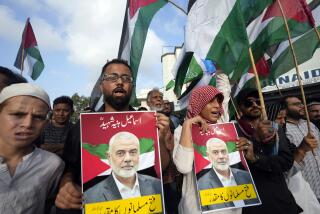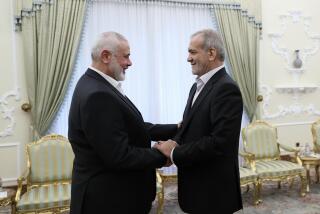Rumors Fly After Prominent Iraqis Slain in Jordan
- Share via
CAIRO — Masked attackers invaded the hilltop villa of a wealthy Iraqi businessman in the Jordanian capital, Amman, this weekend and, using only knives, tortured him and his dinner guests before scattering eight corpses throughout the house.
What made the Saturday night massacre even more shocking to authorities in the normally quiescent city was that one of the victims was Hikmat Hejju, Iraq’s No. 2 resident diplomat in Jordan.
Each of the victims had more than a dozen wounds, indicating that the killings were slow and ruthless. One observer said the slayings--which police, acting on a tip, discovered about midnight--amounted to a “very professional” assassination.
No suspects were immediately arrested, but the lone survivor of the attack, reportedly a cook of Greek ancestry, said she heard the killers speaking Arabic with a distinctive Iraqi accent.
The four or five masked intruders, she said, entered the villa Saturday after guests had gathered for the “iftar,” the meal to break the daily Ramadan fast.
Jordanian officials sealed borders to question any Iraqis found trying to leave the country.
The attack was the second assault on an Iraqi diplomat in Jordan this year, and the Iraqi Foreign Ministry in Baghdad was the first to announce that it had taken place, labeling it Sunday a “cowardly and treacherous act.”
Jordanian Prime Minister Abdul Salam Majali also condemned the killings “for whatever reason and whatever motives,” calling them “an assault on the safety and security of the nation,” according to state television.
Several theories circulated for the slayings, among them that they might have been a strike against the Iraqi regime by Iraqi opposition groups or a case of revenge taken by relatives of four Jordanians who were recently executed in Iraq.
But by late Sunday, Jordanian police and Iraqi exile sources in London were suggesting that the motive for the killings was most likely criminal--that they were a gangland-style rub-out rooted in a dispute over money.
One of the victims, Nemir Ochi, was identified as a member of a billionaire Iraqi-born family whose financial empire in Europe and North Africa has murky origins and has been reputed over the years to have been used as a front for assets of Iraqi President Saddam Hussein and his relatives.
Exile sources said they suspected that Ochi and the others were “liquidated” in a falling-out with Baghdad over whether they had been sending back a fair share of profits, and that the killings could have been “a message” to other business operatives not to shortchange their patrons in the Iraqi leadership.
“The possibility is that these businessmen might have been acting as fronts for the Iraqi regime abroad, and they may have shortchanged Baghdad on a deal or two,” said one leading Jordan-based journalist. “It looks like a very, very professional operation.”
Associated Press, meanwhile, quoted Western diplomats in Amman as saying that Ochi, a food exporter, was suspected of dealing in illegal arms for the Iraqi regime as well. The Iraqi Embassy in Amman, however, said it believed that the killings were “politically motivated.” Hejju, who had been assigned to Jordan for four years, was the embassy’s charge d’affaires, the No. 2 position after ambassador.
Members of a Jordanian-headquartered anti-Hussein opposition group, the Iraqi National Accord, vehemently denied that anyone from their organization had any role in the killings. “The Iraqi opposition does not use these means,” a spokesman for the organization said from Cairo. “Such means are Saddam’s, not the opposition’s.”
In an oddly timed surprise, Hussein decreed Sunday that all Jordanians held in Iraqi prisons or awaiting trial would be freed immediately.
Iraqi-Jordanian relations have been frayed since December, when Iraq hanged four Jordanian citizens who had been arrested for petty smuggling--despite a series of high-level appeals for clemency from Jordan’s government.
According to the Iraqi News Agency, Hussein decided to free the Jordanian prisoners, who are thought to number between 60 and 100, as a goodwill gesture after a two-hour meeting Sunday with a pro-Iraqi Jordanian opposition politician, Laith Shebeilat. He ordered the prisoners to drive out in a convoy behind Shebeilat to Amman.
Because Iraq is under international sanctions that prevent most air travel, adjoining Jordan has become the chief gateway to Iraq.
The small desert kingdom also has become a haven for about 75,000 Iraqi exiles who fled economic and political hardship inside Iraq, a frustrated refugee community that is assumed by diplomats to be thoroughly infiltrated both by Baghdad’s secret police and by Iraqi criminal elements.
The Saturday night killings took place at the white-stone mansion of Iraqi businessman Sami George Thomas in the western Amman suburb of Rabiyeh. Thomas was believed to be a business associate of the Iraqi president’s family for at least a decade, according to wire service accounts.
Among the dead were Hejju’s wife and an Egyptian bodyguard. All of those killed were thought to be Iraqis except for the Egyptian, said a security source quoted by the Reuters news agency.
The slaughter “was carried out in a particularly cruel way. The killers took their time, killing the victims slowly and striking different parts of their bodies,” a Jordanian official told the French news agency Agence France-Presse. Iraq’s Foreign Ministry voiced “deep concern about this series of unprecedented aggressions against Iraqi diplomats in Jordan,” according to a statement issued in Baghdad.
Recently, Rahim Taher, the commercial attache at the Iraqi Embassy in Amman, escaped injury after being fired on from a passing car outside his home. Jordanian authorities have since implicated six Iraqis in the Jan. 3 attack, which they have blamed on a personal vendetta.
More to Read
Sign up for Essential California
The most important California stories and recommendations in your inbox every morning.
You may occasionally receive promotional content from the Los Angeles Times.













